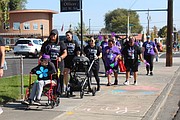Frontotemporal dementia
MOSES LAKE — Dementia is an ugly disease, and there are variants that make it even uglier. Frontotemporal dementia is one of those variants.
World FTD Awareness Week is Sept. 24 to Oct. 1.
The disease has been pushed into the news by the announcement in February that actor Bruce Willis, 68, has been diagnosed with FTD. Willis’ family announced in 2022 that he was retiring from his acting career because he had been diagnosed with aphasia, which affects the ability to speak and to understand the speech of others. The “primary progressive aphasia” that affected Willis is a form of FTD.
Erika Farrell, with the Washington chapter of the Alzheimer’s Association, said while FTD is a form of dementia, it’s rarer and different from Alzheimer’s, with different symptoms and different effects.
“There are some distinctions between something like Alzheimer’s disease and frontotemporal dementia. For one, people are typically diagnosed or start to show signs a little bit earlier, maybe in their 40s, 50s or early 60s,” Farrell said. “And those signs are not necessarily memory loss.”
Memory loss is one of the first signs of Alzheimer’s, but not an early sign of FTD, she said.
“There are different variants within that type of disorder, for example, a person might actually start to exhibit different behavioral symptoms or moodiness, personality changes that just may not be as typical while their memory is still very sharp,” Farrell said.
Frontotemporal dementia makes up about 10 to 20% of dementia cases, according to the Mayo Clinic.
Along with affecting speech and cognitive ability in some cases and behavior in others, FTD can affect the patient’s ability to walk or swallow and other kinds of muscle degeneration.
Because FTD is less common, it’s sometimes misdiagnosed.
“I’ve spoken with people (where) it might have taken them six to 10 years to get an FTD diagnosis,” Farrell said.
“Frontotemporal dementia can be misdiagnosed as a psychiatric problem or as Alzheimer’s disease,” according to the Mayo Clinic.
“In (FTD) the frontal and temporal lobes of the brain shrink,” according to the Mayo Clinic. “In addition, certain substances occur in the brain. What causes these changes is usually unknown.”
There is no cure for FTD and no specific treatments, according to information from the Alzheimer’s Association.
“With frontotemporal degeneration, there are medications and lifestyle interventions that may help reduce some of the symptoms, but no treatments that would be changing the underlying course of the disease, or the progression,” Farrell said.
A lot of the research being conducted into dementia is focused on specific types of the disease, she said, so the research’s applicability to other variations may be limited. But some of the research into helping patients and caregivers manage the symptoms may work for other forms of the disease, she said.
It’s an inherited disease in about one-third of the cases, according to the Alzheimer’s Association.
Researchers with the National Institutes of Health published the results of research earlier this year that may make it easier to identify people with genetic risk factors.
The research focused on what a press release from NIH called “structural variants,” where the disease has altered or removed segments of DNA.
“If you imagine our genetic code as a book, a structural variant would be a paragraph, page or even an entire chapter that has been removed, duplicated or inserted in the wrong place,” said Sonja W. Scholz, a senior author of the study.
Research indicates structural variants play an important role in the development of neurodegenerative disorders, including FTD, according to the NIH release.
Cheryl Schweizer may be reached via email at cschweizer@columbiabasinherald.com.









